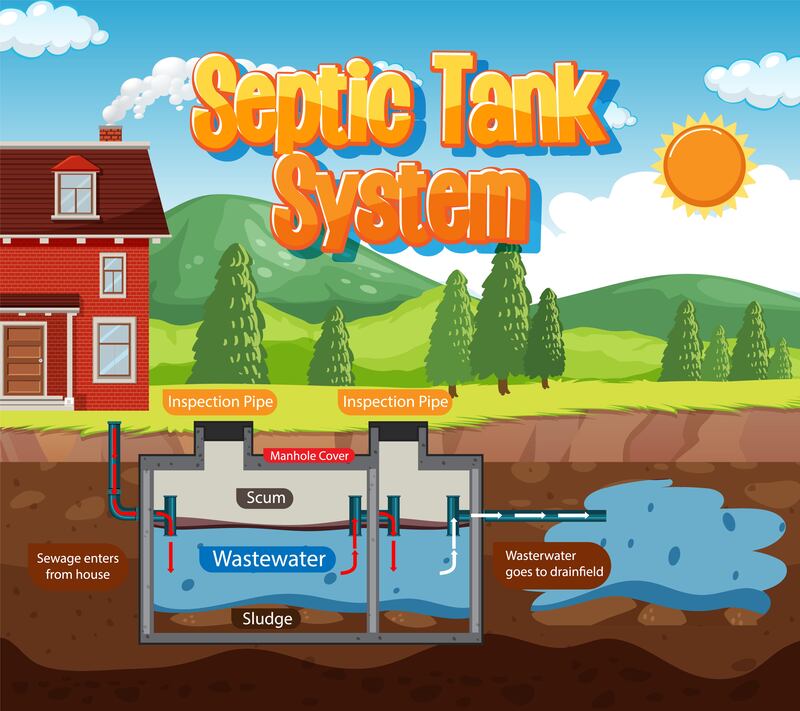Call This Wednesday to Get $25 OFF
Clean Solutions, Dirty Jobs – Done Right. Reliable. Responsive. Remarkable.
Call This Wednesday to Get $25 OFF
Clean Solutions, Dirty Jobs – Done Right. Reliable. Responsive. Remarkable.
Septic systems play a vital role in wastewater management for millions of homes, especially in rural and suburban areas without access to municipal sewage systems. While they are often a practical and efficient solution, septic systems also come with responsibilities, particularly when it comes to protecting the environment. Understanding their potential environmental impact is essential for any homeowner relying on one.

At Septic Connection, we believe that informed homeowners make better environmental stewards. Here's what you should know about how your septic system interacts with the environment, and what you can do to minimize any negative effects.
Before diving into their environmental impact, it’s important to understand how septic systems function. A typical system includes a septic tank and a drain field (or leach field). Wastewater from your home flows into the septic tank, where solids settle at the bottom and lighter materials like grease float to the top. The liquid layer (effluent) flows into the drain field, where it is filtered through the soil and naturally treated before entering the groundwater.
When properly designed and maintained, a septic system is an eco-friendly solution. However, when neglected or improperly installed, it can become a serious environmental hazard.
The septic system is an onsite waste treatment facility, and it is incredibly reliable. However, the system is only as effective…
Imagine flushing your toilet and then suddenly realizing that your backyard has turned into a swampy mess. This unpleasant experience is…
Soil testing is a critical step in various construction and environmental projects. It provides essential information about the ground conditions, which…
Grease traps are remarkable tools that help keep your establishment clean and free from bad odors. Septic Connection has a…
If you have just moved into a new home or property that relies on a septic system for waste and wastewater…
A well-maintained septic system treats wastewater efficiently, but a failing system can contaminate the environment in several ways.
If a septic system leaks or overflows, harmful bacteria, viruses, and nutrients like nitrogen and phosphorus can seep into the groundwater. This not only affects your well water but can also impact nearby water sources used by other homes and wildlife.
Poorly functioning systems can discharge untreated or partially treated wastewater into nearby streams, rivers, or lakes. This can lead to algal blooms, fish kills, and a decline in overall water quality.
When a system is overloaded or clogged, waste can saturate the soil, harming plant life and disrupting the local ecosystem.
Routine septic tank maintenance is the most effective way to prevent environmental damage. Here’s how regular care from a professional septic company helps.
Neglecting maintenance can cause your system to fail, resulting in environmental harm and expensive repairs.
Watch for the following warning signs that your system could be in trouble.
If you notice any of these, contact a trusted septic company immediately to assess the situation.
Alongside professional maintenance, homeowners can take everyday steps to reduce the environmental impact of their septic systems.
At Septic Connection, we take pride in helping homeowners keep their septic systems running efficiently and safely. Our team offers expert septic tank maintenance and repairs designed to protect not only your home but also your environment.
Have questions about your system? Contact Septic Connection today. Let’s work together to keep your septic system and our environment healthy for many years.
When septic problems start, many homeowners look for quick and inexpensive solutions. Online videos, store-bought additives, and advice from well-meaning neighbors can make do-it-yourself septic fixes seem appealing. Unfortunately, septic…
Read moreA septic system is one of the most important—and most overlooked—components of a home. It manages wastewater quietly in the background, so many homeowners assume everything is fine until a…
Read more